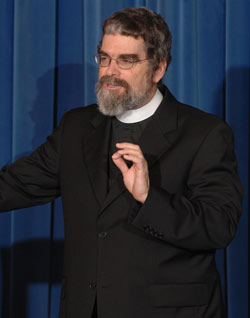By Brother Guy Consolmagno, S.J.
Astronomer, Vatican Observatory, Castel Gandolfo, Italy
2006-2007 Loyola Chair (Physics and Astronomy), Fordham University
Chair, Division for Planetary Sciences, American Astronomical Society
Past President, Commission 16, Planets and Moons, International Astronomical Union
I fell into the scientific life by accident. I chose to attend MIT as much for its science fiction collection as anything else: the career of a mad scientist looked like fun!
Once there, I drove myself to succeed, mostly from a desire to earn praise from my advisors. After my doctorate, when I got my first pure research position and the unsupervised freedom to work for two years on a project, I suddenly discovered that the challenges of solving complex equations or debugging recalcitrant computer programs were nothing compared to the struggle of getting myself up to go in to work in the morning. Hey, I had two years to get results! I could put off work until tomorrow; and there were all those very important things to do in town…
Meanwhile, my scientific career was being buffeted by the intense competition and politicking for jobs and grants and credit on papers. After two terms of postdoctoral work, the only thing I seemed to have discovered was a growing paranoia in myself, convinced that any hurdles I had to getting published (or getting a job) were the result of some nebulous cloud of enemies out to destroy my career.
Recognizing the creeping madness, I quit my research position. Teaching, first in the Peace Corps and then at Lafayette College, was much better; at least I had a schedule to keep, and a measurable sense of achievement with each set of grades turned in. And I enjoyed my colleagues and the students I was teaching. But that, too, began to look like a crazy treadmill. After a year’s effort to educate a lecture hall of sophomores, I was faced with the next year’s sophomores, coming in as ignorant as last year’s. I continued to be haunted by those sleepless three-in-the-mornings; what was the point of it all?
Joining the Jesuits certainly cured those sleepless nights. I experienced the immense relief of finally being where God wanted me to be. And, given my old salary and the all-consuming teaching load of a young professor, the vows of poverty and chastity were nothing new to me! But the third vow, obedience, was a challenge: especially when a letter from Father General assigned me to the Vatican Observatory. Not a life teaching at a university like I had hoped, but a return to that hated, paranoia-inducing world of full-time academic research. Wasn’t this where I had come in?
In fact, it’s nothing like. I’m doing very different research. And just as importantly, the reasons for doing it have completely changed.
Without worries about funding or tenure, being a Jesuit has given me the freedom to choose problems to work on simply because I find them intrinsically interesting… and fun. And if I still care about the good opinion of my peers, it’s no longer for myself but for the Jesuits and the church I represent.
The research I do now is an example of what I once heard another Jesuit scientist call “orphan science.” It’s work that isn’t “sexy.” Work too speculative to assure results by the next conference; indeed, work that takes too long to come to fruition within the lifetime of a typical three-year grant or a six-year assistant professorship. Such work would be madness for anyone with a career (and a family) to support. But it’s work that can be satisfying; and, yes, fun.
My work includes a project to record the colors and light curves of Kuiper Belt objects, icy proto-comets out beyond Neptune; we’ve measured a hundred, and there’s a thousand more to see. I also have a 10-year program to measure the density and porosity of every class of meteorite. And, to my surprise and delight, the results have turned out to be exciting—and widely cited by my colleagues.
My Vatican Observatory position has also given me opportunities based as much on my position “above the fray” (and the grant competition) as any of my own qualities. I certainly never saw any of those open doors before I was a Jesuit!
I recognize that my situation is unique. I appreciate the maddening pressures my lay colleagues still face, the stresses that I couldn’t handle in my day. But perhaps seeing my example, they too can remember on occasion the sense of fun that used to motivate all our work. It is in the joy of studying creation that we meet the Creator who continually surprises us with joy.
By Brother Guy Consolmagno

